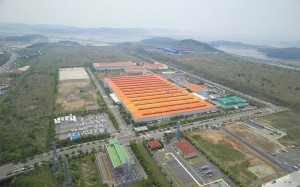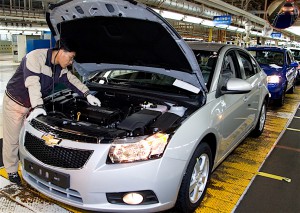General Motors today reached a tentative agreement with its South Korean labor union, a move that is expected to keep the automaker from putting its Korean subsidiary in bankruptcy – though it still is waiting for a final decision on a bailout from the Korea Development Bank.
Faced with plunging sales and rising costs, GM earlier this year announced it would close one of four Korean assembly plants and warned it could seek the Korean equivalent of Chapter 11 protection if it didn’t get a deal from workers and support from the KDB, which owns a 17% stake in GM Korea.
“The labor union has demonstrated its commitment and we continue to work with our other key stakeholders to gain their support,” GM Korea CEO Kaher Kazem said in a statement, noting that ratification of the tentative agreement is “critical” to achieving additional support from shareholders and the Korean government.
Though GM didn’t say exactly how much the agreement would save but it cuts some worker benefits, freezes wages and also cancels the benefits workers had expected to receive this year.
(Showdown in South Korea: GM warns of bankruptcy. Click Here for the story.)
The automaker still has to hear from the government-run Korean Development Bank which is expected to now pump in $500 million in fresh capital. In turn, the Detroit automaker has promised to introduce new models to help boost demand and better utilize the remaining three Korean plants which have been operating at well below their capacity in recent years.
But what happens long-term is far from certain. Part of the problem comes from a domestic slowdown in sales by GM Korea, a subsidiary that once was known as the brand Daewoo. But GMK has also seen U.S. sales drop as demand for small passenger vehicles like the Korean-made Spark has fallen off. Further complicating the situation, GM last year sold off its German-based Opel-Vauxhall subsidiary to PSA Group. The French automaker is expected to drop models like the Korean-made Karl as it shifts to products made in its own factories.
In February, GM said it would close its Gunsan plant due to weak demand. So far, 1,100 workers at the factory have taken a company buyout – as have 1,500 at other GMK facilities, all told a 16% reduction in the subsidiary’s workforce. But, as part of the new settlement, about 680 Gunsan employees may now find work at one of GM’s remaining Korean plants.
(To see more about GM’s $2.8 billion investment plan in South Korea, Click Here.)
The settlement marks a significant turn for the Korean labor movement. Union workers in that have traditionally been some of the auto industry’s most militant, driving production costs up to the point where there has been relatively little cost advantage over production in places like the U.S. – and well above labor costs in emerging markets like Mexico. Local news reports suggested GM’s Korean workers had come under public pressure to settle with the automaker and avoid a bankruptcy that could have driven the automaker out of the market entirely.
GM has shown an increased readiness to walk away from money-losing operations since Mary Barra was named CEO four years ago. Among other things, she has pulled the company out of Europe, South Africa and Russia. And though GM continues producing vehicles in India they are for export only; it no longer operates a dealer network in that country.
(Click Here for details about GM shutting one Korean plant, considering fate of others.)
The automaker still has to clinch the proposed equity infusion from the KDB, along with sought-after tax cuts. But government officials on Monday indicated they would speed up their review of the GM proposal.



Mary, quit the drama and just leave! It took you over 100 years to realize you couldn’t compete in Europe, get out of Korea now.
Though most likely an old pic, I do like that gen Cruze than the current one. The head and tail lamps and fascia hit the sweet spot. Interior treatment was good too for what it is, Cavalier – Cobalt replacement.